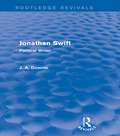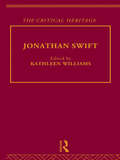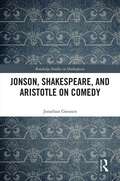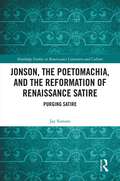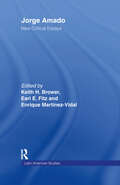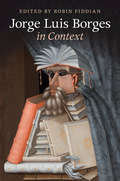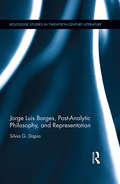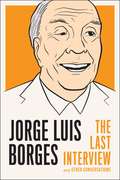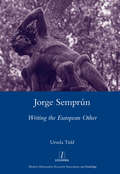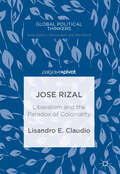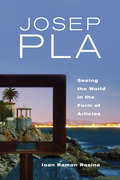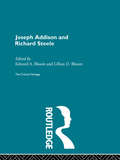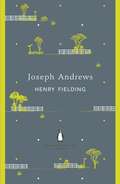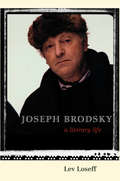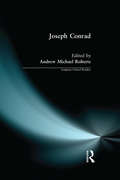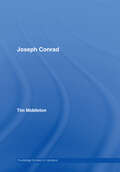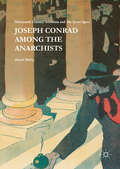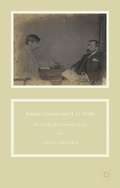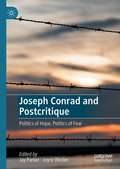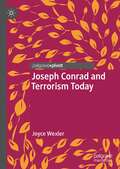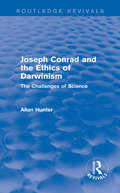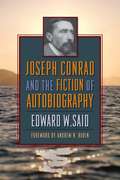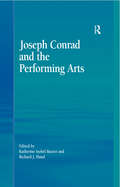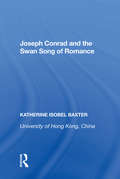- Table View
- List View
Jonathan Swift: Political Writer (Routledge Revivals)
by Alan DownieFirst published in 1984, this biography gives an account of Jonathan Swift’s political ideas and provides a critical commentary on his major works. With its emphasis on Swift as a political writer, the title offers a revision of the prevailing view of Swift’s politics and its application in the study of his works. Alan Downie argues that in terms of the party politics of the day Swift is neither a Whig nor Tory. Swift thought of himself as an ‘Old Whig’, and said he was ‘of the old Whig principles, without the modern articles and refinements’. Downie shows how Swift’s writings consistently make political points about society’s deviation from an ideal. As Swift’s views on morality, religion and politics are so closely linked, an understanding of his political ideas is vital; this reissue provides a detailed analysis of this aspect of Swift’s writings and views, and as such will be of great interest to any students researching his satire.
Jonathan Swift: The Critical Heritage (Critical Heritage Ser.)
by Kathleen WilliamsThe Critical Heritage gathers together a large body of critical sources on major figures in literature. Each volume presents contemporary responses to a writer's work, enabling student and researcher to read the material themselves.
Jonson, Shakespeare, and Aristotle on Comedy (Routledge Studies in Shakespeare)
by Jonathan GoossenJonson, Shakespeare, and Aristotle on Comedy relates new understandings of Aristotle’s dramatic theory to the comedy of Ben Jonson and William Shakespeare. Typically, scholars of Renaissance drama have treated Aristotle’s theory only as a possible historical influence on Jonson’s and Shakespeare’s drama, focusing primarily on their tragedies. Yet recent classical scholarship has undone important misconceptions about Aristotle’s Poetics held by early modern commentators and fleshed out the theory of comedy latent within it. By first synthesizing these developments and then treating them as an interpretive theory, rather than simply an historical influence, this book demonstrates a remarkable consonance between Aristotelian principles of plot and its emotional effect, on the one hand, and the comedy of Shakespeare and Jonson, on the other. In doing so, it also reveals surprising similarities between these seemingly divergent dramatists.
Jonson, the Poetomachia, and the Reformation of Renaissance Satire: Purging Satire (Routledge Studies in Renaissance Literature and Culture)
by Jay SimonsDoes satire have the ability to effect social reform? If so, what satiric style is most effective in bringing about reform? This book explores how Renaissance poet and playwright Ben Jonson negotiated contemporary pressures to forge a satiric persona and style uniquely his own. These pressures were especially intense while Jonson was engaged in the Poetomachia, or Poets’ War (1598-1601), which pitted him against rival writers John Marston and Thomas Dekker. As a struggle between satiric styles, this conflict poses compelling questions about the nature and potential of satire during the Renaissance. In particular, this book explores how Jonson forged a moderate Horatian satiric style he championed as capable of effective social reform. As part of his distinctive model, Jonson turned to the metaphor of purging, in opposition to the metaphors of stinging, barking, biting, and whipping employed by his Juvenalian rivals. By integrating this conception of satire into his Horatian poetics, Jonson sought to avoid the pitfalls of the aggressive, violent style of his rivals while still effectively critiquing vice, upholding his model as a means for the reformation not only of society, but of satire itself.
Jorge Amado: New Critical Essays
by Earl E. Fitz Keith H. Brower Enrique Martínez-VidalFirst published in 2001. Routledge is an imprint of Taylor & Francis, an informa company.
Jorge Luis Borges in Context (Literature in Context)
by Robin FiddianJorge Luis Borges (1899–1986) is Argentina's most celebrated author. This volume brings together for the first time the numerous contexts in which he lived and worked; from the history of the Borges family and that of modern Argentina, through two world wars, to events including the Cuban Revolution, military dictatorship, and the Falklands War. Borges' distinctive responses to the Western tradition, Cervantes and Shakespeare, Kafka, and the European avant garde are explored, along with his appraisals of Sarmiento, gauchesque literature and other strands of the Argentine cultural tradition. Borges' polemical stance on Catholic integralism in early twentieth-century Argentina is accounted for, whilst chapters on Buddhism, Judaism and landmarks of Persian literature illustrate Borges's engagement with the East. Finally, his legacy is visible in the literatures of the Americas, in European countries such as Italy and Portugal, and in the novels of J. M. Coetzee, representing the Global South.
Jorge Luis Borges, Post-Analytic Philosophy, and Representation (Routledge Studies in Twentieth-Century Literature)
by Silvia G. DapíaMaking an important contribution to studies in Literature and Philosophy, this book reads Jorge Luis Borges philosophically, particularly in reference to his use of representation and reality. Rather than attempting to subordinate Borges to a set of philosophical constructs, to reduce Borges’ texts to mere exemplifications or illustrations of philosophical theories, the book uses Borges’s short stories to demonstrate how philosophical questions related to representation develop out of literature and actually serve as precursors to the various strains of post-analytic philosophy that later developed in the United States. The volume discusses American post-analytic philosophers Richard Rorty, Hilary Putnam, Donald Davidson, Nelson Goodman, and Arthur Danto, as well as a wide-ranging set of philosophical ideas including reflections on Keynes, Hayek, Schopenhauer and many others . Chapters offer detailed readings of Borges’ texts extending from 1939 to 1983, locating where he thematizes issues of representation, and pursuing the logic of Borges’s text toward its philosophical implications without neglecting their literary value. The book argues that Borges’ exploration of the relationship between representation and reality places him unmistakably in the position of a precursor to the post-analytic philosophers. Illuminating the role that language plays in the creation of reality and representation, this volume makes significant contributions not only to Borges scholarship but also post-structuralism, post-analytic studies of language, semiotics, comparative literature, and Latin American literature.
Jorge Luis Borges: The Last Interview (The Last Interview Series)
by Jorge Luis Borges Kit Maude"Believe me: the benefits of blindness have been greatly exaggerated. If I could see, I would never leave the house, I'd stay indoors reading the many books that surround me." --Jorge Luis BorgesDays before his death, Borges gave an intimate interview to his friend, the Argentine journalist Gloria Lopez Lecube. That interview is translated for the first time here, giving English-language readers a new insight into his life, loves, and thoughts about his work and country at the end of his life. Accompanying that interview are a selection of the fascinating interviews he gave throughout his career. Highlights include his celebrated conversations with Richard Burgin during Borges's time as a lecturer at Harvard University, in which he gives rich new insights into his own works and the literature of others, as well as discussing his now oft-overlooked political views. The pieces combine to give a new and revealing window on one of the most celebrated cultural figures of the past century.From the Trade Paperback edition.
Jorge Semprun: Writing the European Other
by Ursula Tidd"The Spanish Communist exile and Francophone Holocaust writer Jorge Semprun (1923-) is a major contributor to contemporary debates on the politics and ethics of remembering the Franco era, Communism and the Holocaust in French, Spanish and broader European contexts. His sophisticated literary testimonies have become landmark texts not least for their commitment to represent the lived experience of history. In this first detailed study in English of Jorge Semprun's writing, Ursula Tidd shows how Semprun explores the parameters of self-writing as an address to the other in a richly intertextual corpus which weaves together history, fiction and auto/bio/thanatography, and gives voice to the traumatic experiences of geographical and political exile and concentration camp internment. Ursula Tidd is Senior Lecturer in French Studies at the University of Manchester, UK."
Jose Rizal: Liberalism And The Paradox Of Coloniality (Global Political Thinkers Ser.)
by Lisandro E. ClaudioThe global history of liberalism has paid too much attention to the West, neglecting the contributions of liberals from colonial nations. This book mines the thought of Filipino propagandist and novelist, Jose Rizal, to present a vision of liberalism for the colonized. It is both an introduction to Rizal and a treatise on rights, freedom, and tyranny in colonial contexts. Though a work on history, it responds to the illiberal present of rising authoritarianism and populism.
Josep Pla: Seeing the World in the Form of Articles
by Joan ResinaJosep Pla is Catalonia’s foremost twentieth-century prose writer. He witnessed and wrote about some of the twentieth-century’s most notable events including the Spanish Civil War and the foundation of the state of Israel. Due to a lack of translations of his work he is only now being discovered by the international audience and will soon join the ranks of major realist writers in world literature. In Josep Pla, Joan Ramon Resina teases out the writer’s deep-seated intellectual concerns and challenges the assumption of Pla as an anti-intellectual. Resina condenses Pla’s forty-seven volumes of work, including travel books, narrative fiction, and history, into eleven thematic units: including time, memory, perception, life, religion, metaphysics, utopia, and self-delusion. Resina acutely explores the writer’s authorial gaze and invites the reader to see the world through the eyes of one of the most underappreciated observers and writers of the twentieth-century.
Joseph Addison and Richard Steele: The Critical Heritage
by Lillian D. Bloom Edward A. BloomFirst Published in 1995. Routledge is an imprint of Taylor & Francis, an informa company.
Joseph Andrews (The Penguin English Library)
by Henry FieldingWith an essay by Mark Spilka.'Kissing, Joseph, is but a prologue to a Play. Can I believe a young fellow of your Age and Complexion will be content with Kissing?'Henry Fielding's riotous tale of innocents in a corrupt world was one of the earliest English novels, blending bawdy slapstick, philosophical musing and pointed social satire to create a work of moral complexity and generous, life-affirming humanity. Published in 1742, it tells the story of the chaste servant Joseph Andrews who, after being sacked for spurning the advances of the lascivious Lady Booby, takes to the road, accompanied by his beloved Fanny Goodwill and the absent-minded, much put-upon Parson Adams. There they encounter robbers, tricksters, seducers, mishaps and strange twists of fortune, in a series of adventures filled with exuberant comedy.The Penguin English Library - 100 editions of the best fiction in English, from the eighteenth century and the very first novels to the beginning of the First World War.
Joseph Brodsky: A Literary Life
by Lev LoseffThe work of Joseph Brodsky (1940-1996), one of Russia's great modern poets, has been the subject of much study and debate. His life, too, is the stuff of legend, from his survival of the siege of Leningrad in early childhood to his expulsion from the Soviet Union and his achievements as a Nobel Prize winner and America's poet laureate. In this penetrating biography, Brodsky's life and work are illuminated by his great friend, the late poet and literary scholar Lev Loseff. Drawing on a wide range of source materials, some previously unpublished, and extensive interviews with writers and critics, Loseff carefully reconstructs Brodsky's personal history while offering deft and sensitive commentary on the philosophical, religious, and mythological sources that influenced the poet's work. Published to great acclaim in Russia and now available in English for the first time, this is literary biography of the first order, and sets the groundwork for any books on Brodsky that might follow.
Joseph Conrad
by J. H. Stape J. H. Stape Allan H. Simmons Allan H. SimmonsJoseph Conrad is one of the great figures in the tradition of the English novel. This book provides a critically-informed introduction to Conrad and his work, placing him in his political, social, and literary context, and examining his relationship to Modernism, England and Empire. It covers the range of Conrad's fiction, from the early Malay novels, through such key works as Heart of Darkness, Lord Jim, Nostromo, The Secret Agent, and Under Western Eyes, to his later novels.
Joseph Conrad (Longman Critical Readers)
by Andrew Michael RobertsJoseph Conrad is a key figure in modernist fiction, whose innovative work engages with many of the crucial philosophical, moral and political concerns of the twentieth century. This collection of major critical readings of his work is arranged according to the issues which each critic addresses, issues which are of crucial importance, and in many cases remain controversial, within contemporary literary theory and criticism. Following an opening section on the critical tradition, indicating how the study of Conrad's work has been politicised since the 1970s, there are sections on 'Narrative, Textuality and Interpretation', 'Imperialism', 'Gender and Sexuality', 'Class and Ideology', and 'Modernity'. Within each section two or three critical excerpts offer contrasting and complementary accounts of the fiction, while the headnotes to each piece and the introduction place these excerpts within the wider critical debate, clarifying for the reader both the theoretical issues and the interpretation of Conrad's fiction. A glossary of terms and a bibliography categorised by critical approach complete a volume which will provide an invaluable resource for students of Conrad and twentieth-century literature as well as other readers of Conrad's work.
Joseph Conrad (Routledge Guides to Literature)
by Tim MiddletonThe popular yet complex work of Joseph Conrad has attracted much critical attention over the years, from the perspectives of postcolonial, modernist, cultural and gender studies. This guide to his compelling work presents: an accessible introduction to the contexts and many interpretations of Conrad’s texts, from publication to the present an introduction to key critical texts and perspectives on Conrad’s life and work, situated in a broader critical history cross-references between sections of the guide, in order to suggest links between texts, contexts and criticism suggestions for further reading. Part of the Routledge Guides to Literature series, this volume is essential reading for all those beginning detailed study of Joseph Conrad and seeking not only a guide to his works, but also a way through the wealth of contextual and critical material that surrounds them.
Joseph Conrad Among the Anarchists
by David MulryThis book looks at the inception, composition, and 1907 publication of The Secret Agent, one of Joseph Conrad's most highly regarded political novels and a core text of literary modernism. David Mulry examines the development and revisions of the novel through the stages of the holograph manuscript, first as a short story, then as a serialized sensation fiction in Ridgway's Militant Weekly for the American market, before it was extensively revised and published in novel form. Presciently anticipating the climate of modern terror, Conrad's text responds to the failed Greenwich Bombing, the first anarchist atrocity to occur on English soil. This book charts its historical and cultural milieu via press and anarchist accounts of the bombing, to place Conrad foremost among the dynamite fiction of revolutionary anarchism and terrorism in the late nineteenth and early twentieth centuries.
Joseph Conrad and H. G. Wells
by Linda DrydenJoseph Conrad and H. G. Wells: The Fin de Si#65533;cle Literary Scene is the first sustained examination of the literary friendship between Conrad and Wells. Drawing upon biographies, letters, archival material and a close analysis of texts, the book traces the relationship between Conrad and Wells at the close of the nineteenth and the dawn of the twentieth centuries. It offers perspectives on both authors from literary figures like Ford Madox Ford and provides a unique analysis of the temperamental and artistic differences that ultimately caused Conrad and Wells to become estranged. At the same time, Joseph Conrad and H. G. Wells uses critical insights into the works of both authors to trace the ways in which the authors influenced each other's work. What emerges is a clear picture of the literary scene at the fin-de-si#65533;cle and consideration of how the English novel was evolving in the opening years of the twentieth century.
Joseph Conrad and Postcritique: Politics of Hope, Politics of Fear
by Joyce Wexler Jay ParkerThis book takes a postcritical perspective on Joseph Conrad’s central texts, including Heart of Darkness, The Secret Agent, Under Western Eyes, and Lord Jim. Whereas critique is a form of reading that prioritizes suspicion, unmasking, and demystifying, postcritique ascribes positive value to the knowledge, affect, ethics, and politics that emerge from literature. The essays in this collection recognize the dark elements in Conrad’s fiction—deceit, vanity, avarice, lust, cynicism, and cruelty—yet they perceive hopefulness as well. Conrad’s skepticism unveils the dark heart of politics, and his critical heritage can feed our fear that humanity is incapable of improving. This Conrad is a well-known figure, but there is another, neglected Conrad that this book aims to bring to light, one who delves into the politics of hope as well as the politics of fear.
Joseph Conrad and Terrorism Today
by Joyce WexlerThis book explores how the anarchist fiction of Joseph Conrad can help us understand terrorism today. Conrad undermines the popular view that terrorists are fanatics. He portrays anarchists and police as counterparts driven by the human desires for autonomy and affiliation, the need to control their own lives and to be part of a group. Postcritique encourages readers to consider the accuracy of such information, and research in Terrorism Studies confirms Conrad’s insights: his characters are more realistic and his political stance is more hopeful than critics have recognized.
Joseph Conrad and the Ethics of Darwinism: The Challenges of Science (Routledge Revivals)
by Allan HunterFirst published in 1983, this book explores a number of avenues of critical thinking about Joseph Conrad, showing him as an author deeply concerned with humankind’s ethical motivation and its relationship with the ideas of evolution current in his day. Allan Hunter establishes Conrad’s detailed knowledge of the leading evolutionary arguments of the period and the main questions posed: were ethics God-given or were morals merely an evolved attribute? His novels are shown as debates with, and extensions of, the theories of Huxley, Darwin, Carlyle, Spencer, Lombroso and others on the nature of humanity and altruism.
Joseph Conrad and the Fiction of Autobiography
by Edward SaidEdward W. Said locates Joseph Conrad's fear of personal disintegration in his constant re-narration of the past. Using the author's personal letters as a guide to understanding his fiction, Said draws an important parallel between Conrad's view of his own life and the manner and form of his stories. The critic also argues that the author, who set his fiction in exotic locations like East Asia and Africa, projects political dimensions in his work that mirror a colonialist preoccupation with "civilizing" native peoples. Said then suggests that this dimension should be considered when reading all of Western literature. First published in 1966, Said's critique of the Western self's struggle with modernity signaled the beginnings of his groundbreaking work, Orientalism, and remains a cornerstone of postcolonial studies today.
Joseph Conrad and the Performing Arts
by Katherine Isobel BaxterConrad's fiction is characterized by an enduring recourse to the performing arts for metaphor, allegory, symbol, and subject matter; however, this aspect of Conrad's non-dramatic works has only recently begun to come into its own among literary critics. In response to this seminal moment, Joseph Conrad and the Performing Arts offers an exciting, interdisciplinary forum for one of the most interesting and nascent areas of Conrad studies. Adopting a variety of theoretical approaches, the contributors examine major and neglected works within the context of the performing arts: cultural performance in Conrad's Malay fiction; Conrad's use and parody of popular traditions such as melodrama, Grand-Guignol, and commedia dell'arte; Conrad's engagement with the visual culture of early cinema; Conrad's interest in the motifs of shadowgraphy (shadow plays); Conrad's relationship to Shakespeare; and the enduring influence of opera on his work. Taken together, the essays provide, through solid scholarship and richly provocative speculation, new insight into Conrad's oeuvre, and invite future dialogue in the burgeoning field of Conrad and the performing arts.
Joseph Conrad and the Swan Song of Romance
by Katherine Isobel BaxterIn the first critical study wholly devoted to Joseph Conrad's use of techniques associated with the literary tradition of romance, the author argues that Conrad's engagement with the genre invigorated his work throughout his career. Exploring the ways in which Conrad borrows from, alludes to, and subverts the tropes of romance, the author suggests that Conrad's ambivalent relationship with popular forms like the adventure novel is revealed in the way he uses romance conventions to disrupt narrative expectations and make visible ethical problems with Europe's colonial project. The author examines not only familiar novels like Lord Jim but also less-studied works such as Romance and The Rover, using Robert Miles's model of the 'philosophical romance' to show that for Conrad, romance is also philosophically engaged with issues of ideology. Her study enables a new appreciation of the ways in which Conrad continued to experiment, even in his later fiction, and of the ethical import of that aesthetic experimentation.
